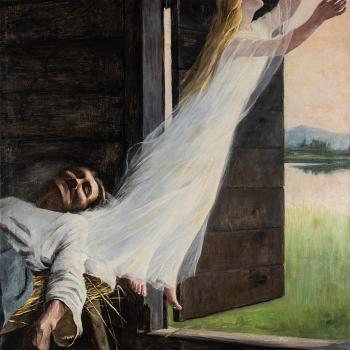You write convincingly that, in the context of how Jesus would have been understood in his time, the New Testament suggests he displayed a sense of humor, that he did not hide it under a bushel. Can you give an example of that?
Scripture scholars have told me that the humorous elements of some of Jesus's parables and stories are largely lost on us, because we are so far removed from his time and culture. (And therefore may not "get" some of the humor.) One scholar said that he expected that people of the day found some of Jesus's stories "hilarious."
Just look at his image of having a plank of wood in your eye while criticizing someone with a speck of dust in theirs. It's a rather silly image, isn't it? Really over-the-top. I quote one author in the book who said that his four-year-old son once laughed uproariously when he first heard this. Which points to another reason we downplay Jesus's humor. Not only do we not "get" some of the humor; the humor that we do "get" we may have heard too often—like this story—and so have become rather deadened to the joke.
I've always thought of the exchange between Jesus and his mother to be something warmly humorous—Mary, like many of us mothers, seeing something that needs attending to and using the son at her disposal to see to it. Can you expand on how that might be seen in a humorous and yet spiritual way?
As we believe that Jesus was fully human (and divine) and Mary was human, as well as very open and loving people we must assume that they had a sense of humor. Not having a sense of humor would mean that they weren't human! And you can see some traces of this. (Why we don't see more traces is something I cover in the book.)
For example, there are two ways of reading the story of the Wedding at Cana, where Mary asks Jesus to help the crowd that has run out of wine. Jesus says, "Woman, what business is this of yours?" And Mary says to the steward "Do whatever he tells you." Her comments are usually said in very somber tones. Often it's used as an indication of Mary's desire for us to follow Jesus, which is true of course.
But I once heard a priest once proclaim the reading with Mary as an exasperated mother saying, with a wave of the hand, "Oh, do whatever he tells you!" As in: "Hey, my Son won't listen to me! Maybe you'll have more luck." And the crowd laughed. It opened up for me a new way of seeing Mary: patient, faithful, but also somewhat exasperated with Jesus. She was human after all, and clearly was initially confused by what her son was doing. Remember the time when she and the rest of her family are outside of Jesus's house saying that they think he's gone crazy? So perhaps she was exasperated a bit, at least at first. Her words at Cana may (I wasn't there so I don't know) reveal a little humor.
But overall, they were both human, and so they must have had a sense of humor and surely laughed.
Why might it be heretical to consider Jesus of Nazareth, the messiah, not possessing a sense of humor?
Having a sense of humor is part of being "fully human." So to say that he didn't have a human attribute is to say that he wasn't fully human, which is a heresy. Also, in the book I mention a psychologist to whom I posed this question: What would a person without a sense of humor be like? She said that a person without humor would be incapable of entering into social situations, would miss regular "cues" from others and would have a hard time relating to others. That is the opposite of the Jesus we know from the Gospels.
The life of faith is full of funny little ironies. One that you mention in the book pertains to our Ash Wednesday liturgy and practice. We hear a reading that says, "Wash your face, so that your fasting may not be seen by others," then immediately get in line to have our foreheads smeared. How does enjoying these ironies help us with our own self-awareness and our "wakefulness"?
As G.K. Chesterton said, "It is the test of a good religion whether can joke about it." While we need to take God and our faith seriously, we have to admit that from time to time that Catholics occasionally do some funny things and, as Chesterton said, it's okay to laugh. Pope Benedict, in a quote I mention in the book, also says that God sometimes wants us not to take things so seriously.
What role does gratitude play in joy?
An immense part. Gratitude is the gateway to the spiritual life. Reminding ourselves of what we're grateful for reminds us of our reliance on, and our relationship with God, which leads to joy. On a simpler level, those without gratitude cannot live joyful lives.
How do you think Western prosperity influences our capacity for joy, for better or worse?
I think for worse, frankly. Pope Paul VI, in his letter "On Christian Joy," speaks of the paradox of a culture that has almost everything it needs and still lacks joy. Part of this is a certain ignorance of how good we have it. But that forgetfulness is rather easy: I spent two years working in East Africa during my Jesuit training, and I vowed that I would never, once I came home, take for granted things like hot water, air conditioning, medical care, things like that. When I came back I was so grateful for all of that. But in a few months I was taking them for granted. So it needs to be combated.





